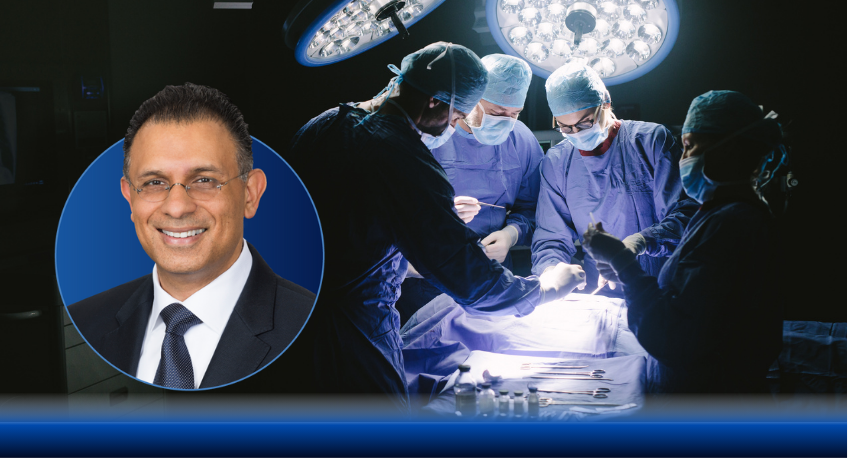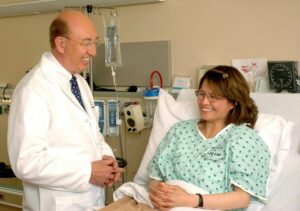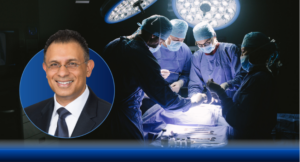
Using VitalStream for cardiac surgery with Zain Khalpey, MD
We sat down with Zain Khalpey, M.D. Cardiothoracic Surgeon, Director of Artificial Heart, MCS & ECMO, and Chief Medical AI Officer (Network Director) at Honor Health in Arizona, to discuss how he uses the VitalStream noninvasive hemodynamic monitor to deliver safer and more effective care for his patients.
Why did you decide to start using VitalStream for cardiac surgery?
I started using VitalStream because I was intrigued with the technology. It’s wearable technology in an ecosystem that has traditionally been invasive.
What I like is that it’s a true fingerprint of a patient. The technology provides you with continuous data starting from before the surgery through discharge.
And frankly, for a few months there was a shortage of continuous cardiac output Swans and we had to depend on something. VitalStream was extremely helpful during that time.
Have you found VitalStream to be accurate?
I was extremely skeptical when I started using VitalStream. I didn’t think it could be more accurate than a Swan-Ganz catheter or a derived Fick. But we verified it using Fick in the OR and ICU, mixed venouses and echo.
When we performed aortic valve surgery, after we replaced the valve, you could see an immediate change in cardiac output with VitalStream. With the Swan, there was a lag. So VitalStream basically became more real-time accurate.
And when you look into the science, you find that VitalStream uses something called Pulse Decomposition Analysis. It gives you the true physiological reasoning as opposed to other devices that use a derived mathematical formula.
It’s comforting to know that it is accurate and, in some cases, more accurate than what we are used to.
What types of procedures have you performed while using VitalStream?
So far, we’ve used VitalStream for open coronary artery bypass grafting, mitral valve surgery, aortic valve surgery, robotic CABG, TAVR and robotic convergent procedures – and it’s performed well on all.
For transcatheter valve surgeries, we’ve actually abandoned using arterial lines. VitalStream saves time, is safer and we have accurate readings.
I’ve also used it in my clinic for 6-minute walk tests on patients who have heart failure.
What do you see as the biggest benefit of using VitalStream?
Better quality of care and better decision making. With VitalStream, we’re able to identify the true change in physiology from a baseline. It’s not masked because you induce the patient and then you get your lines in. You actually know what the baseline is in preop, you see what happens when the patient gets intubated and then you see the change coming off bypass.
Also, when you have a patient that has done well, you want to de-line them very quickly, which can be very liberating for the patient, but you lose a lot of information. And in order to make better decisions you need the right data. VitalStream gives us the safety net of knowing the cardiac index, cardiac output, SVR, etcetera so we can tweak and polish postoperative care. And it’s all sitting on their wrist. It keeps us a lot more accurate than what we’ve been used to so patients can leave sooner. I’ve also seen less incidence of renal failure or impairment because we are making better decisions before the operation, in the operation, in the ICU and the early days after the ICU.
More medical news and events

Virginia Catalyst Awards Caretaker Medical with Grant to Advance VitalStream Development for Improved Patient Outcomes
The Virginia Catalyst, also known as the Virginia Biosciences Health Research Corporation (VBHRC), has awarded $3.18 million in grants to four life and bioscience projects…

Intraoperative Hypotension: A Public Safety Announcement for Anesthesia Professionals
This article from the Anesthesia Patient Safety Foundation Newsletter discusses the modifiable risk of intraoperative hypotension (IOH) and its far-reaching consequences for patients and healthcare…

Using VitalStream for cardiac surgery with Zain Khalpey, MD
We sat down with Zain Khalpey, M.D. Cardiothoracic Surgeon, Director of Artificial Heart, MCS & ECMO, and Chief Medical AI Officer (Network Director) at Honor…
